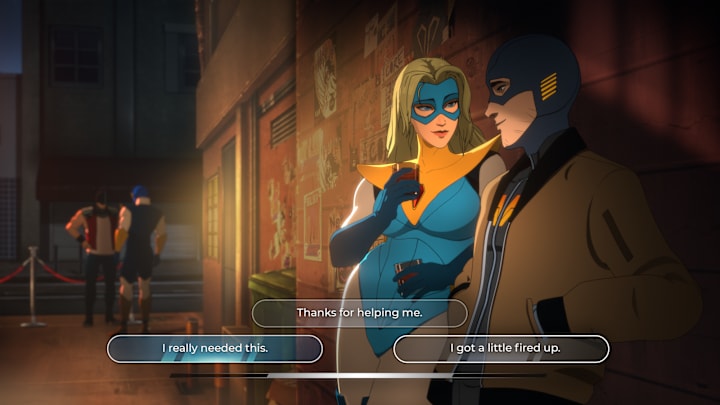Dispatch looks like a proper evolution of the Telltale style narrative game
By Kirk McKeand

“A team made of former Telltale developers” is up there with Blizzard devs as far as new studio pitches go, but from the little I’ve seen of Dispatch from Adhoc Studio, this one definitely lives up to the legacy. The natural humour of Tales from the Borderlands and strong characterisation of The Wolf Among Us drip from the screen thanks to a sharp script delivered with gusto by an all-star cast. It’s a superhero workplace comedy with Aaron Paul, Jeffrey Wright, Laura Bailey, Matt Mercer, and Erin Yvette delivering killer performances. There are also some YouTubers.
Dispatch has you play as Robert Robertson, aka Mecha Man, a Tony Stark without the money or brains to fix his broken suit. He’s forced to take a job working as a dispatcher for a group of former supervillains, responding to emergency calls by sending in the right supe for the job. If he can mentor these lesser heroes, the Superhero Dispatch Network will pay for his suit repair.
It mixes traditional Telltale-style dialogue choices with time and resource management strategy and hacking minigames, interspersed with bloody and brilliant animation with a colourful comic book style. Player choices impact relationships and change the direction of the story.
“Put your headset on and introduce yourself to these pricks,” a sweary Jeffrey Wright tells Aaron Paul, who introduces himself as Robert Robertson to a wave of laughter. Later, one hero accuses him of wanting a “creamy dick in his face” because he chose the wrong donut type. If you’re wondering about the tone, it’s in line with The Boys and Invincible, where real stakes bring the drama and naturally funny dialogue keeps the pace brisk.
Each hero you manage has unique stats divided into five categories: combat, vigour, agility, charisma, and intellect. As the calls come in, you use this information to decide who’s best for the job based on the objectives. Someone has a balloon stuck in a tree? You need a hero who can climb 40ft and not make the kid cry. You’re given a percentage chance of success based on their stats, and team composition and other effects can reveal hidden traits and buffs to make life easier. The demo sees them send Invisigal, revealing a trait that she works better as a lone wolf, reducing travel time to emergencies. Of course, you can always change your odds as heroes level up by attempting missions.
Sometimes heroes in the field call for assistance and can be injured if you fail to back them up, decreasing their stats temporarily. Mess up too much and they become downed, taking them out of action for the rest of the shift. Sometimes the call gets a mid-mission dialogue choice where you have to guide them to the best outcome. Of course, they might not listen.
For the major missions, you get a camera feed with fully animated scenes where your choices have a huge impact and you’re thinking on the fly as flashy, choreographed fight scenes play out. These can be dialogue choices or time pressure as you complete a hacking minigame to unlock camera feeds around the building.
It really feels like an evolution of Telltale’s style of storytelling, wrapping the story in this basic strategy layer that adds depth to the characters and impacts the team dynamic. The way it’s all presented, written, and acted brings it all together.
I’m excited to get my hands on it when the first two episodes land on October 22 on PS5 and PC. Two more episodes will arrive weekly until the finale lands on November 12.